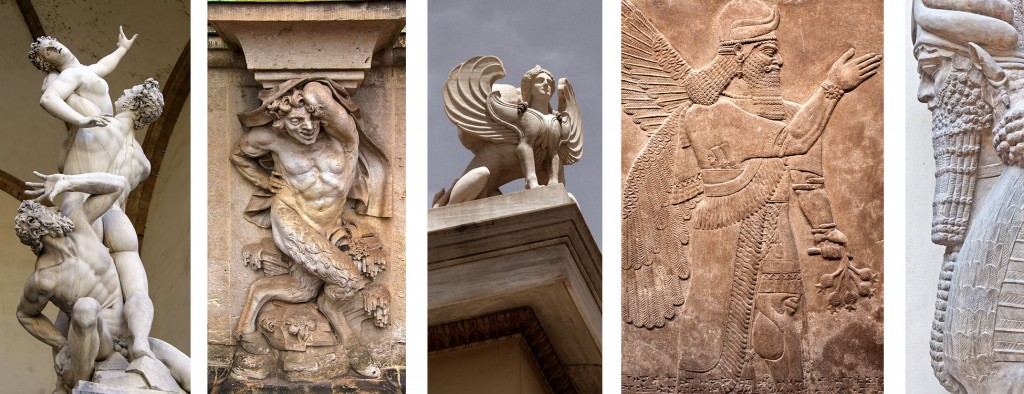In the last post, I looked at the most famous Biblical genealogy of Jesus Christ to prove that the Biblical notion of history is always very literary, but not always very literal. We must understand the Bible in its own ancient Near Eastern context, in the perspective of the original writers and readers to whom the text was given.
I believe that the Bible is God’s Word and as such, it is breathed out of God through the writings of men inspired by the Holy Spirit. So, while the Biblical writers are very human and therefore very much creatures of their time and culture, there is also another author who is operating providentially behind the writing of the text to communicate transcendent truth, and that is the author and finisher of our faith, God Himself.
How He actually does this, I am not sure, but the divine authorship does not reduce the human authorship to dictation or automatic writing. God uses the genre conventions and mindset of the ancient time period within which to communicate His transcendent truth.
This is what is called “accommodation” by theologians. In the same way that Jesus Christ is God incarnate within human flesh, so the Scriptures are God’s message incarnate within human writings of the ancient Jewish world. A major part of that Jewish worldview was the special calling of a nation out of the nations of the earth to be His own people. God does separate Himself from the gods of the pagans, but at the same time, he utilizes much of the mythopoeic imagination that Israel shared with its pagan neighbors to communicate that separation (I will give examples of this in upcoming posts – fun, fun, fun!).
 One of the complaints of Christian theologians and apologists about the use of imagination and poetics in articulating or defending the faith is that it tends to lack the clarity of logical argumentation and rational discourse. They claim the fuzziness and ambiguity of images, stories, metaphors and symbols tend to obscure or dilute the message of the Gospel. My book Word Pictures: Knowing God Through Story and Imagination deconstructs this rationalistic modernist fallacy as unbiblical. God uses so much imagery, symbolism, metaphor and poetic figurative language throughout the Scriptures (about 80% of the Bible) that one could even say he prefers it to abstract logical propositions (about 20% of the Bible).
One of the complaints of Christian theologians and apologists about the use of imagination and poetics in articulating or defending the faith is that it tends to lack the clarity of logical argumentation and rational discourse. They claim the fuzziness and ambiguity of images, stories, metaphors and symbols tend to obscure or dilute the message of the Gospel. My book Word Pictures: Knowing God Through Story and Imagination deconstructs this rationalistic modernist fallacy as unbiblical. God uses so much imagery, symbolism, metaphor and poetic figurative language throughout the Scriptures (about 80% of the Bible) that one could even say he prefers it to abstract logical propositions (about 20% of the Bible).
Jesus is famous — or should I say infamous — for using parables to teach about the Kingdom of God instead of rational sermons of doctrinal exposition. Ironically, He quotes the Old Testament as explanation for why He used such fuzzy ambiguity in His parables:
Matthew 13:10–17
Then the disciples came and said to Him, “Why do you speak to them in parables?” And He answered them, “To you it has been given to know the secrets of the kingdom of heaven, but to them it has not been given. For to the one who has, more will be given, and he will have an abundance, but from the one who has not, even what he has will be taken away. This is why I speak to them in parables, because seeing they do not see, and hearing they do not hear, nor do they understand. Indeed, in their case the prophecy of Isaiah is fulfilled that says:‘“You will indeed hear but never understand,
and you will indeed see but never perceive.”
For this people’s heart has grown dull,
and with their ears they can barely hear,
and their eyes they have closed,
lest they should see with their eyes
and hear with their ears
and understand with their heart
and turn, and I would heal them.’But blessed are your eyes, for they see, and your ears, for they hear. For truly, I say to you, many prophets and righteous people longed to see what you see, and did not see it, and to hear what you hear, and did not hear it.”
The use of parables by Jesus had the two-fold purpose of revealing the truth to those who were repentant and therefore had “ears to hear,” while concealing truth from those who were unrepentant in rejecting him. Imagination was used to separate those who would “get it” from those who didn’t want to get it.
But the parables used the commonly understood terms of the ancient Jewish agrarian culture: wheat and chaff, farmers and fishermen, kings and servants. God accommodated his message through the thought forms of that time.
The problem for some is that the Bible also refers to other ancient mythical constructs like sea dragons, satyrs, and sphinxes (of which, we will discuss in upcoming posts). The list of people who do not “get it” include those who see such mythopoeic imagery in the Bible and say, “See! The Bible contains foolish antiquated myths and is therefore irrelevant to our brilliant godlike modern minds that finally perceive the true nature of reality.” This hubris is called “demythologization.” It is the attempt to discredit the Bible by reducing it to ignorant mythological thought. It amounts to cultural imperialism, the arrogant exaltation of the modern naturalistic worldview as superior to the ancients. And it completely misses God’s message. It is that blindness that Jesus spoke about.
As John Calvin wrote of “anthropomorphites” who try to demythologize the Bible:
The Anthropomorphites also, who imagined God to be corporeal, because the Scripture frequently ascribes to him a mouth, ears, eyes, hands, and feet, are easily refuted. (For who, even of the meanest capacity, understands not, that God lisps, as it were, with us, just as nurses are accustomed to speak to infants? Wherefore, such forms of expression do not clearly explain the nature of God, but accommodate the knowledge of him to our narrow capacity; to accomplish which, the Scripture must necessarily descend far below the height of his majesty.
(Institutes of the Christian Religion, I, xiii)
So God “lowers” himself, if you will, to the understanding of those he is communicating to. This makes sense as being the most effective means, since ancient Near Eastern minds were steeped in very common images, symbols, and other thought forms. I will address some examples of ancient Near Eastern imagination redeemed by God’s mythopoeic accommodation in the next few posts.
And you just won’t understand it if you’re unimaginative. You’ll be one of those blind dullards Jesus and Isaiah talked about. So open up your imagination a little.



3 comments on “Of Myth and the Bible – Part 2: Modern Cultural Imperialism”
“And you just won’t understand it if you’re unimaginative. You’ll be one of those blind dullards Jesus and Isaiah talked about. So open up your imagination a little.”
Hi Brian, have you ever engaged an unbelieving dullard before?
If you have, did you, perchance, inform your interlocutor that they are a bit on the dull side?
If so, was it received gratefully?
Just asking so that I might employ it as well.
🙂 🙂
Comments are closed.